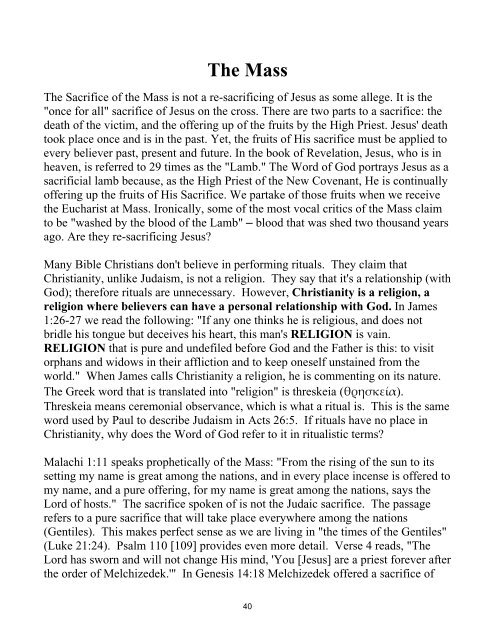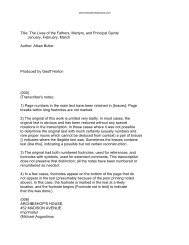Sebastian R. Fama - St. Patrick's Basilica
Sebastian R. Fama - St. Patrick's Basilica
Sebastian R. Fama - St. Patrick's Basilica
You also want an ePaper? Increase the reach of your titles
YUMPU automatically turns print PDFs into web optimized ePapers that Google loves.
The Mass<br />
The Sacrifice of the Mass is not a re-sacrificing of Jesus as some allege. It is the<br />
"once for all" sacrifice of Jesus on the cross. There are two parts to a sacrifice: the<br />
death of the victim, and the offering up of the fruits by the High Priest. Jesus' death<br />
took place once and is in the past. Yet, the fruits of His sacrifice must be applied to<br />
every believer past, present and future. In the book of Revelation, Jesus, who is in<br />
heaven, is referred to 29 times as the "Lamb." The Word of God portrays Jesus as a<br />
sacrificial lamb because, as the High Priest of the New Covenant, He is continually<br />
offering up the fruits of His Sacrifice. We partake of those fruits when we receive<br />
the Eucharist at Mass. Ironically, some of the most vocal critics of the Mass claim<br />
to be "washed by the blood of the Lamb" – blood that was shed two thousand years<br />
ago. Are they re-sacrificing Jesus?<br />
Many Bible Christians don't believe in performing rituals. They claim that<br />
Christianity, unlike Judaism, is not a religion. They say that it's a relationship (with<br />
God); therefore rituals are unnecessary. However, Christianity is a religion, a<br />
religion where believers can have a personal relationship with God. In James<br />
1:26-27 we read the following: "If any one thinks he is religious, and does not<br />
bridle his tongue but deceives his heart, this man's RELIGION is vain.<br />
RELIGION that is pure and undefiled before God and the Father is this: to visit<br />
orphans and widows in their affliction and to keep oneself unstained from the<br />
world." When James calls Christianity a religion, he is commenting on its nature.<br />
The Greek word that is translated into "religion" is threskeia (θρησκεία<br />
Threskeia means ceremonial observance, which is what a ritual is. This is the same<br />
word used by Paul to describe Judaism in Acts 26:5. If rituals have no place in<br />
Christianity, why does the Word of God refer to it in ritualistic terms?<br />
Malachi 1:11 speaks prophetically of the Mass: "From the rising of the sun to its<br />
setting my name is great among the nations, and in every place incense is offered to<br />
my name, and a pure offering, for my name is great among the nations, says the<br />
Lord of hosts." The sacrifice spoken of is not the Judaic sacrifice. The passage<br />
refers to a pure sacrifice that will take place everywhere among the nations<br />
(Gentiles). This makes perfect sense as we are living in "the times of the Gentiles"<br />
(Luke 21:24). Psalm 110 [109] provides even more detail. Verse 4 reads, "The<br />
Lord has sworn and will not change His mind, 'You [Jesus] are a priest forever after<br />
the order of Melchizedek.'" In Genesis 14:18 Melchizedek offered a sacrifice of<br />
40






